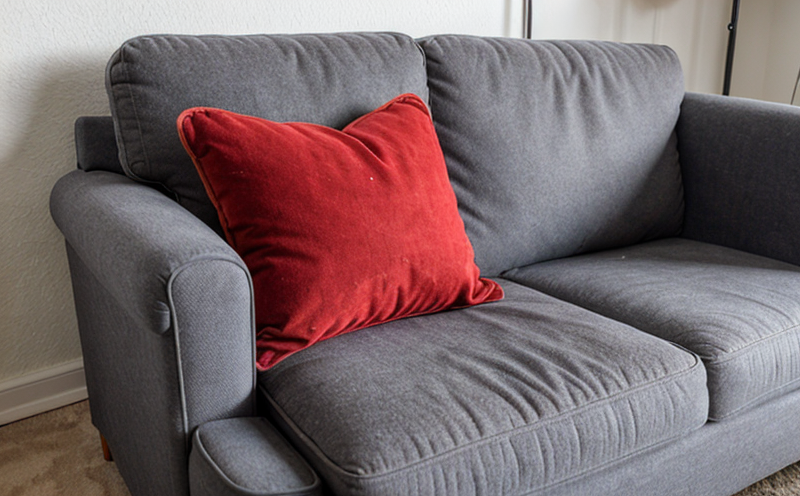NF EN 1021 Upholstery Cushion Ignitability Safety Testing
The NF EN 1021 standard is a critical component in ensuring safety and compliance within the furniture industry, particularly for products that incorporate upholstered cushions. This test evaluates the ignition resistance of upholstery and cushion materials used in furniture to prevent accidental ignition which can lead to fires. Compliance with this standard ensures that furniture manufacturers meet stringent European requirements aimed at enhancing public safety by reducing fire hazards.
The NF EN 1021 test is designed to assess the ignitability of upholstered cushions under controlled conditions, simulating real-world scenarios where a person might come into contact with or sit on the cushion. The standard applies primarily to furniture intended for domestic use but may also cover other types of seating if they are similar in design and function.
The testing procedure involves placing a sample cushion in a specially designed apparatus that exposes it to heat sources such as an electrically heated wire. The test measures both the time taken for ignition to occur and the rate at which flames spread once they do begin. This data is crucial for manufacturers who want to ensure their products meet European safety standards, thereby protecting consumers from potential fire risks.
For accurate testing, it's essential to follow the guidelines outlined in NF EN 1021 precisely. These include using specific types of cushion materials and ensuring proper specimen preparation before conducting tests. Specimens must be cut into standard sizes and shapes to ensure consistency across different samples being tested. Proper instrument calibration is also vital for obtaining reliable results.
Understanding the implications of not complying with NF EN 1021 can help manufacturers appreciate why this testing is so important. Non-compliance could result in product recalls, fines, and damage to brand reputation due to safety concerns raised by consumers or regulatory bodies. By adhering to these standards, companies demonstrate their commitment to producing safe products that meet international quality benchmarks.
Accurate and thorough NF EN 1021 testing requires specialized equipment tailored specifically for this purpose. Laboratories equipped with such facilities should have trained personnel capable of interpreting test results correctly. Regular calibration of instruments ensures consistent performance over time, which is crucial when performing multiple tests on various samples.
In conclusion, NF EN 1021 provides a robust framework for assessing the ignitability properties of upholstery cushions used in furniture products. By following its procedures carefully and interpreting results accurately, manufacturers can produce safer, more reliable items that contribute positively to public safety while maintaining their competitive edge in the market.
Why It Matters
The NF EN 1021 standard plays a crucial role in safeguarding consumers by preventing accidental ignition of upholstered cushions found in furniture. Accidents involving fire can have severe consequences, including property damage and loss of life. Ensuring that cushion materials are resistant to igniting under certain conditions helps mitigate these risks significantly.
From a business perspective, compliance with NF EN 1021 offers several advantages beyond just avoiding penalties associated with non-compliance. It enhances the reputation of manufacturers who demonstrate their dedication to quality and safety standards. Additionally, meeting these requirements opens up opportunities for international trade by aligning with European regulations.
For research and development teams within furniture companies, understanding NF EN 1021 allows them to innovate safer products without compromising aesthetic or functional aspects. They can experiment with different materials and designs while knowing that they are adhering to established guidelines. This approach fosters creativity and ensures that any new product introduced into the market will meet stringent safety criteria.
Lastly, quality managers play a key role in overseeing compliance efforts related to NF EN 1021 standards. They ensure that all necessary steps are taken to prepare specimens correctly and conduct tests accurately according to specified procedures. Their oversight helps maintain consistent quality across batches of products being produced.
Quality and Reliability Assurance
The implementation of NF EN 1021 is essential for maintaining high levels of product reliability and customer satisfaction within the furniture industry. By adhering to these standards, manufacturers can ensure that their cushions meet rigorous quality benchmarks set by international authorities.
Reliable cushion materials are critical for providing comfort and support while also ensuring longevity during use. Non-compliance with NF EN 1021 could lead to premature failure of cushions due to insufficient resistance against ignition sources. This would result in unsatisfactory customer experiences, potentially leading to negative reviews or returns.
Quality assurance processes that incorporate NF EN 1021 help identify potential issues early on in the production cycle. Regular inspections and testing ensure that only materials meeting the required specifications are used for manufacturing. This proactive approach enhances overall product reliability by catching defects before they become apparent during end-user interactions.
In addition to enhancing product quality, compliance with NF EN 1021 also contributes positively towards environmental sustainability goals. Fire-resistant cushions contribute less to accidental fires which can spread rapidly in densely populated areas like homes and offices. Reducing the incidence of such incidents promotes safer living environments for everyone involved.
Environmental and Sustainability Contributions
Reduced risk of accidental fires due to cushion materials meeting strict ignitability criteria.
Promotes safer homes and offices by minimizing the likelihood of rapid fire spread within these environments.
Encourages responsible purchasing decisions from consumers who can trust that their furniture meets international safety standards.
Simplifies compliance requirements for manufacturers seeking to export products into Europe, where adherence to NF EN 1021 is mandatory.
Fosters innovation in sustainable cushion materials by providing clear guidelines for developers working on fire-resistant alternatives.
Supports training programs aimed at educating personnel involved in the design and production of furniture about best practices related to ignitability testing.





